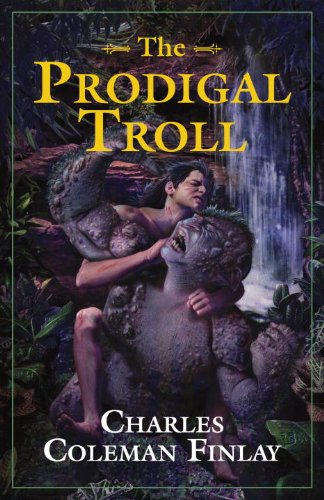
 The Prodigal Troll by Charles Coleman Finlay
The Prodigal Troll by Charles Coleman Finlay
Although many cultures have a similar story, the most famous prodigal is that of the parable of Jesus told in Luke 15:11-31. In it, a young man takes his inheritance, leaves his family, and seeks his fortune in the wider world. He soon learns that the world is a cruel place and ends up returning to his father. The term “prodigal” eventually came to mean one who returned after a long absence, usually after finding trouble apart from their families.
The prodigal in Charles Coleman Finlay’s The Prodigal Troll is Maggot, a young man heir to power who ends up being reared by a lowly troll. Similar to Edgar Rice Burroughs’ Tarzan of the Apes, Maggot is a human reared by a more bestial race. Finlay’s trolls are what we expect: although not savage, they live a primitive, subsistence life, and with the constant push of humanity into their territory, are slowly dying out. Maggot, being human, desires to improve his life and that of the trolls who have become his family, but when he realizes that trolls would rather keep the status quo, he leaves seeking both a mate and encounters with human culture.
Although Maggot’s seeking a mate drives much of the plot (the first true woman he sees he falls in love with, and his search for her is a great deal of the motivation for his continued interaction with humanity) it is really his interaction with the different societies of Finlay’s world that is most intriguing. This can really be broken up into three different cultures. The first is his life among the trolls. The second his life among the Gaelic/Native American tribal culture that is being overrun by the third culture, a western style medieval monarchy. Maggot’s attempt to impose what he knows of troll culture onto human interactions creates both humor for the story and sympathy for his character.
Finlay’s exploration of the way humans interact with each other and the effect of war, love, and the exotic on the human psyche is fun to read. Written in epic fantasy style, Finlay proves that epics do not have to take twelve volumes, or even a trilogy, to delve into the enigma of humanity. He writes with a wonderful cadence, inserting action at just the right moments, but allowing his characters time for introspection as well, but never so much has to slow the pace. The ebb and flow of the plot makes The Prodigal Troll a stay-up-all-night read.
Although the novel is an epic fantasy in its formula, it is not formulaic. There is no pat answer to the questions it raises, and even the ending does not resolve in the way a reader comes to expect from epic fantasy. This is not to say that the ending is not satisfying (although in my opinion, it is a bit abrupt) — it’s just different from the standard. The concept of the “prodigal” has a lot to do with how the story is resolved.
At times, in battle scenes, I got a little lost as to the placement of characters, as perhaps too much is happening at one time. There are some elements, like the magic and the “Old Ones” that aren’t really explained, but in a sense that actually enhances the feeling of Maggot’s bewilderment. It is a violent novel, gruesomely describing some the horrors of sword and bow warfare (weak stomachs beware!). Maggot also learns languages a little too quickly to my mind — either that, or Finlay has failed to adequately make clear the length of time that has passed in which he learned it. This is a minor thing, but it stood out to me as a reader.
Readers of Black Gate will recognize some portions of the The Prodigal Troll, as it partially appeared in that magazine’s pages. Fans of Tarzan or the man-raised-by-wolves genre will love this addition to the canon. Finlay takes this genre and really uses it to explore and decry some of the excesses of the human race. Maggot is a part of humanity by nature, but very different from it by nurture, and his outsider’s perspective glaringly portrays humanity’s faults.
Charles Coleman Finlay writes entrancingly and The Prodigal Troll, the first novel by this prolific short story writer, is a gem in the fantasy genre.
FanLit thanks John Ottinger III from Grasping for the Wind for contributing this guest review.


so you're saying I should read it? :)
This blog post beautifully captures the essence of Edwige Fenech's contribution to the giallo genre! Her performances are so captivating,…
As a native New Yorker, I love the idea of the city being filled with canals and no skyscrapers! And…
How did I miss this? Thanks for bringing it to my attention!
I guess that is true, Marion. And when it comes to "You Only Live Twice," I saw the movie TWICE…